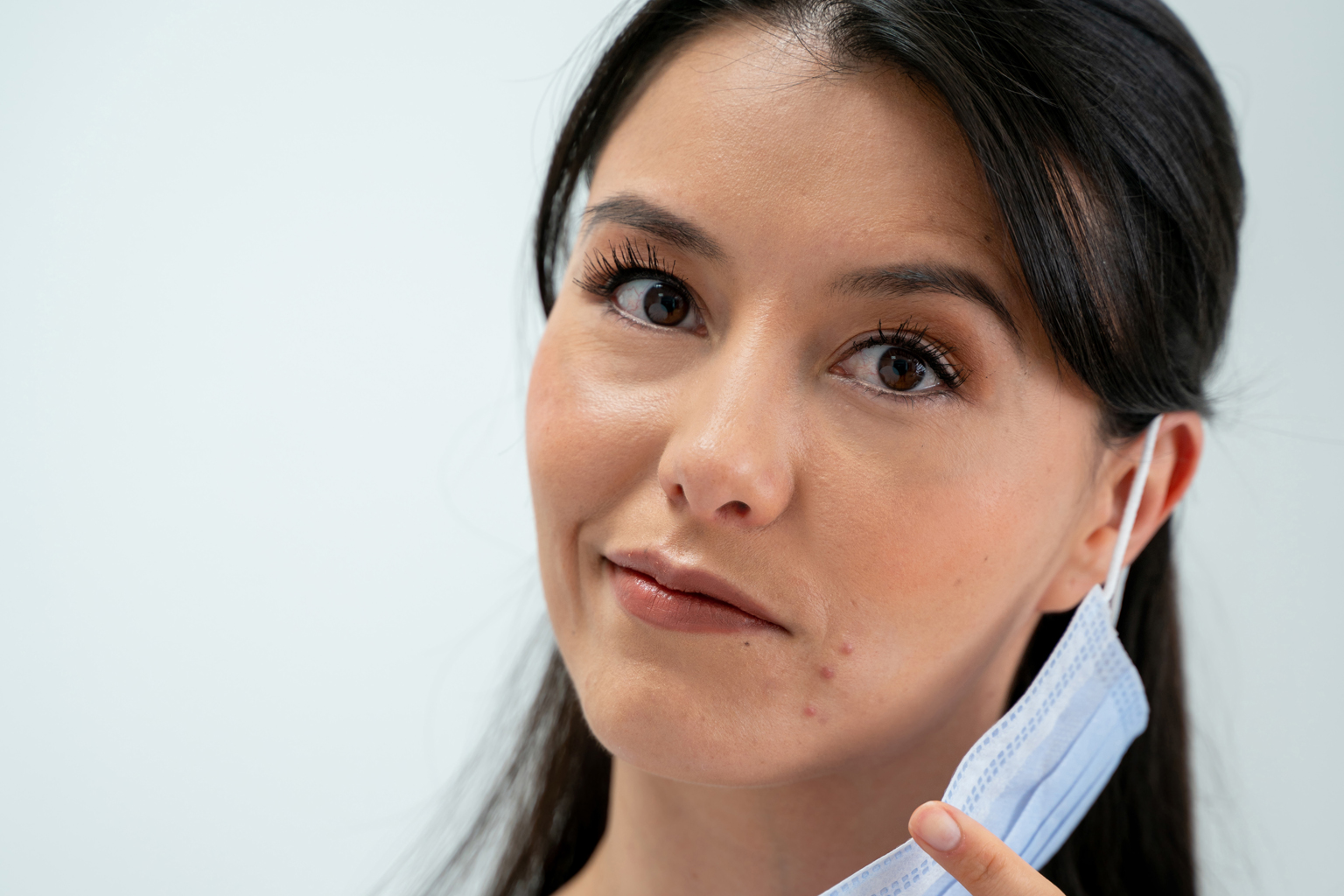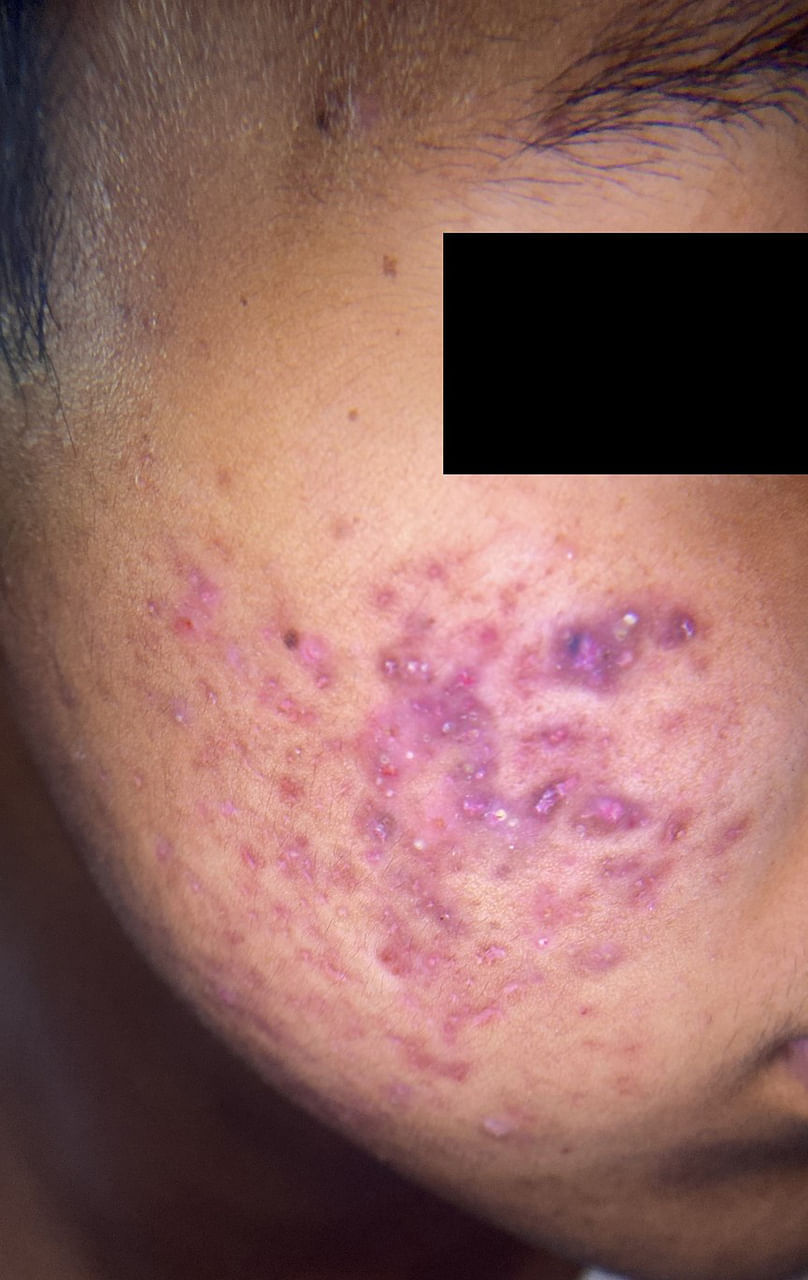Got 'maskne'? 7 tips to keep clear of skin woes linked to mask wearing
Sign up now: Get ST's newsletters delivered to your inbox

The retention of heat and humidity from perspiration and exhaled air within the mask may lead to acne.
PHOTO: ISTOCKPHOTO
SINGAPORE - It has been almost a year since the wearing of masks outside one's home was made compulsory in Singapore to control the spread of Covid-19.
With mask-wearing now a way of life here, skin doctors have seen more cases of "maskne" - acne or skin irritation caused by prolonged mask usage.
Dr Tan Wei Sheng, consultant dermatologist and medical director at Dermatology & Co clinic, has been seeing two to three cases of "maskne" each day since the start of the circuit breaker last April.
One possible cause is the retention of heat and humidity from perspiration and exhaled air within the mask, which leads to acne, says Dr Tan.
"Changes to the skin's flora, or the micro-organisms which reside on the skin, happen with increased heat retention that also contributes to the formation of acne," he adds.
Friction caused by constant pressure and the rubbing of the mask on the skin may also lead to a type of acne known as acne mechanica.
Other dermatologists here have also seen an increase in skin conditions linked to mask-wearing.
Dr Eileen Tan, a dermatologist at Mount Elizabeth Novena Hospital, has seen a 15 to 20 per cent rise in skin consultations related to mask-wearing since it was mandated in April last year.
Her patients often suffer from skin infections such as eczema, acne or folliculitis, which is the infection of one's hair follicles.
"In my clinical practice, the most common skin issue caused by frequent mask-wearing is eczema, which affects those who have sensitive skin or existing eczema," says Dr Tan.
Eczema often appears on the skin as redness, flaking, or pressure sores, or even oozing and crusting in more severe cases, which often leave scars, she adds.
Dr Pan Jiun Yit, senior consultant at the National Skin Centre, has also seen patients with eczema or acne caused by mask-wearing.
All have responded well to treatment and changed their mask-wearing habits or types of mask they wear, he says.
Engineer Derrick Tan, 30, has changed his lifestyle to minimise skin issues from mask-wearing.
Last September, he saw a skin specialist after noticing pimples around his chin and neck each time he removed his mask.
He was diagnosed with maskne or acne mechanica, and given antibiotics and creams.
"It got a lot better since then, but I think this has helped me to be more conscious of the mask being a potential cause (of acne). So I try to avoid situations where I have to wear a mask, such as going out for social gatherings less frequently," says Mr Tan, who works mainly from home.
Essential workers such as front-line healthcare workers are at even greater risk of skin issues as their masks are more tight fitting and they have to wear them longer, notes Dr Eileen Tan.
A study published in the Journal of the American Academy of Dermatology in May last year surveyed 700 healthcare workers in Hubei, China, and found that over 70 per cent of them had dry skin, and 52.5 per cent experienced itchy skin.
The nasal bridge, where the mask rests, was the most common area of irritation, the study found.
Dr Tan Wei Sheng notes that mask-wearing could also trigger flare-ups in people with existing skin conditions, such as rosacea, where patients have red bumps and redness around the nose, cheeks and mouth.
There may also be allergic reactions to the rubber latex in the elastic loops of the masks usually worn by healthcare workers, he adds.

ctnskin07 - The patient has multiple inflamed pimples at the cheeks and chin corresponding to the mask area.
PHOTO: Dr Tan Wei Sheng, Dermatology & Co
When using reusable masks, skin doctors say it is important to practise good mask hygiene.
Dr Tan says: "If reusable masks are not washed regularly, they can retain oil and dead skin cells as well as bacteria. This may play a small part in maskne.
"Hence it is important for reusable masks to be washed daily with a gentle soap."
He says it is also important to ensure one's mask has a good fit.
"It should not be too tight to cause excessive pressure, but it shouldn't be too loose that it moves about on the face, as doing so could cause even more friction on the skin," he adds.
Agreeing that the daily washing of reusable masks is important, Dr Pan adds that people with sensitive skin should opt for masks made of light polyester materials.
While cotton masks allow for more airflow, he says they may lead to increased sweating, especially given the humidity here.
Ms Hilary Kong, 39, who works in the hotel industry, had a skin infection partly as a result of wearing a mask at work during phase two of the reopening of Singapore's economy last year.
It started with one or two cysts on her face.
Having to wear a mask aggravated her skin, which "did not have time to heal or breathe", she says. "It was uncomfortable and painful."
Since then, she has gone for silk masks. Silk masks are known to be more comfortable as they cause less friction on the skin.
"I've also avoided putting make-up around my chin and ensure that I wash my masks daily," she says.
Seven tips to prevent maskne
To prevent maskne, Dr Eileen Tan, dermatologist at Mount Elizabeth Novena Hospital suggests the following:
1. Take a 15-minute "mask break" every four hours, although you should remove your mask only when it is safe to do so. Many healthcare workers say this practice has helped them to better protect their skin.
2. Wash your cloth mask frequently, or after each use, where possible.
This removes the oils and skin cells that collect in the mask, which could lead to a skin problem.
3. Avoid wearing make-up if you have skin conditions as this may clog your pores, leading to breakouts.
If make-up is necessary, use products that are oil-free or non-comedogenic so they will not clog or block your pores.
4. Avoid or reduce the use of new or harsh skincare products which could be irritating to the skin, such as glycolic acid or retinol- related products, which are typically used for anti-ageing, acne and pigmentation. These have a higher risk of causing skin irritation with long hours of mask-wearing.
5. Moisturise your face at least 30 minutes before putting on your mask, preferably with a light, non-greasy moisturiser.
6. After taking off your mask, wash your face immediately. This helps to remove the grease, dead skin and bacteria which have built up over the day.
7. Pat your skin dry, instead of rubbing water off with a towel, to maintain the skin's natural moisture.


